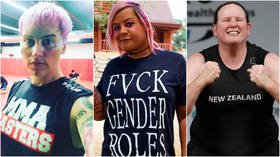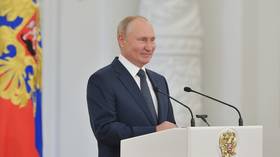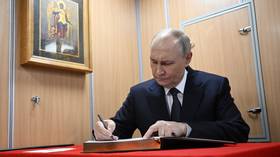Transgender fighters pose a danger in combat and are no answer to prejudice, warns ex-UFC star – & the debate goes deeper than MMA

A former UFC star has become the latest voice to join the debate around transgender fighters facing opponents born as women – and the debate shows no signs of slowing across sport.
Speaking after one of the first openly transgender athletes to compete in MMA in the US won on her debut last weekend, ex-title challenger Demian Maia has insisted that criticizing the prospect of fighters who were born as men being allowed to take on female-born opponents is not a form of prejudice.
Alana McLaughlin, who became the the first transgender MMA fighter known to have competed for seven years when she won last week, has already shot back in what is another fierce debate around the contentious issue.
McLaughlin is unequivocal that transgender athletes should be able to compete and was unimpressed by MMA fighter Jake Shields' claim that she had won on the basis of her strength despite her opponent, Celine Provost, being the more skilled of the adversaries.
Also on rt.com ‘That’s not a legitimate win’: Fans react to debut victory by American transgender MMA fighter Alana McLaughlin"Which is completely unprecedented in combat sports, right?" she asked Shields of his analysis.
"Every fight is supposed to be exactly 100 percent matched in strength and skill, nobody is ever stronger or more skilled right? Do you hear yourself?
"I have to admit, I'm a little salty. If I were cis, fight fans would love me for a come-from-behind victory and showing heart and weathering adversity.
"Instead... I'm an inferior fighter who is also somehow too dangerous to be allowed to fight. Shroedinger's fighter."
McLaughlin is right that many people are worried by what they perceive as a danger to fighter safety caused by opponents with the physical attributes of men entering female divisions.
Which is completely unprecedented in combat sports, right? Every fight is supposed to be exactly 100% matched in strength and skill, nobody is ever stronger or more skilled right? Do you hear yourself? https://t.co/c8RHMsdVrt
— Alana McLaughlin🏳️⚧️ (@AlanaFeral) September 17, 2021
I have to admit I'm a little salty. If I were cis, fight fans would love me for a come-from-behind victory and showing heart and weathering adversity but instead... I'm an inferior fighter who is also somehow too dangerous to be allowed to fight. Shroedinger's fighter.
— Alana McLaughlin🏳️⚧️ (@AlanaFeral) September 17, 2021
“I think it’s absurd for you to put a person who was born a man to fight a woman," middleweight and welterweight scrapper Maia told Intelligence Ltd.
“It is very clear that you cannot let this happen. It’s one thing for a man to want to fight a woman and for a woman to say: ‘Okay, I’m going to fight. The choice is mine’.
"Now, for you to force a woman to fight a transgender person who was born a man, is absurd. I think that only those who are not in the sport accept this, because they have no idea what it is [about].”
A hot topic across sport, some of the debate around the issue has focused on the involvement of athletes who go through puberty before they transition and the importance of the age at which reassignment treatment begins.
Laurel Hubbard, the weightlifter who made history by briefly appearing for New Zealand at the Tokyo 2020 Olympic Games, did not transition until they were in their 30s.
Also on rt.com New Zealand prime minister Jacinda Ardern backs transgender Olympic weightlifter Hubbard as former champ slams ‘unfair’ inclusionSome argued that Hubbard had no right to take the place of an Olympian and suggested that they would not have enjoyed the success they did in their career had they been taking part in the male sport.
New Zealand prime minister Jacinda Ardern was among those to back Hubbard, while athletes and even senior figures involved in the sport called for rules around testosterone levels to be reassessed.
The International Olympic Committee's leading medical chief has since confirmed that the guidelines will change, and the potential outlawing of transgender atheletes from taking part in athletics in the US remains the focus of numerous state lawsuits.
In MMA, the stakes for a mismatch that should have been avoided can be life-threatening. The best-known and most divisive fight that has been used in the debate was between transgender fighter Fallon Fox and Tamikka Brents, which ended in a brutal defeat for Brents in 2014.
At the time, former UFC champion Ronda Rousey pointed out that there is "no undo button" on puberty, and promotion president Dana White said: "I don't think someone who used to be a man and became a woman should be able to fight a woman."
Also on rt.com Olympics boss admits guidelines on transgender athletes need change... as controversial weightlifter breaks silence to thank himBrents, whose injuries included an orbital bone fracture and seven staples, later said that she had felt freakish strength from Fox despite being "abnormally strong" herself.
Maia voiced his concerns that transgender brawlers could inflict serious harm on their rivals through an unfair advantage.
"There is no comparison," Maia believes of the differences between transgender and female-born fighters.
"‘Oh, but she started taking [female] hormones early on’ – [that] does not matter. The development there… and it’s not prejudice, none of that.
"But you have to understand that to work on the issue of prejudice in society, it’s not like that. This is not what will make people more or less prejudiced."
If they Both agree to it why not fight? But I'm definitely betting on the guy to win
— Call me Order, Call me Chaos 🇵🇭🇨🇦🇨🇳 (@critictheworld) September 16, 2021
To me, we are making all this unnecessarily complicated. You fight within your biological category. What pronoun or gender you want to be called, I am fine with. That is a different matter than athletic competition
— JT🌐🗽🚀 (@JTyler36213241) September 16, 2021
Speaking after McLaughlin's win last week, former middleweight champion Michael Bisping said he had no issue with transgender rights but felt that fighters who made the transition would have to sacrifice the option to face female opponents.
UFC bantamweight fighter Sean O'Malley has also said he is opposed to it. “It’s like she had testosterone for, who knows, 20 to 30 years of her life and now, 'I’m a girl,'" he said.
"You could tell that’s [McLaughlin] a dude. A jacked girl. I mean, look at those arms.”
Not everyone concurs with Maia. "If they both agree to it, why not fight?" asked one fan. "But I'm definitely betting on the guy to win."
Another said: "Male fighters shouldn’t decide who female fighters should be allowed to fight.
Male fighters shouldn’t decide who female fighters should be allowed to fight. They are free to have opinions, but it’s not them signing their names on the contracts.
— Cale Chips (@veggiebrah) September 16, 2021
If you're in the same weight category and have similar muscle mass, then it's literally not a problem.
— JVtheExplorer (@vthe_j) September 17, 2021
"They are free to have opinions, but it’s not them signing their names on the contracts."
Others have echoed the argument that the specific physical demands and risks of MMA make it poorly suited to the concept – and said that clarifying steps should be taken in a bid to settle the broader problem in sport.
"To me, we are making all this unnecessarily complicated," said one observer.
"You fight within your biological category. What pronoun or gender you want to be called, I am fine with. That is a different matter to athletic competition."
Also on rt.com Trans MMA fighter Fallon Fox wants ‘transphobic’ Joe Rogan podcast canceled














